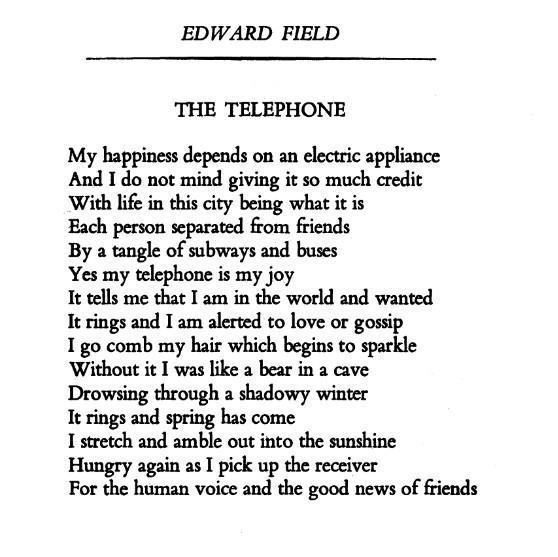
The Telephone By Edward Field Guide Questions And Answers: A Comprehensive Study
“The Telephone” by Edward Field is a compelling modern poem that explores themes of communication, distance, and emotional disconnection. Whether you’re a student, teacher, or poetry enthusiast, understanding the nuances of this poem can deepen your appreciation for Field’s work. This guide on The Telephone by Edward Field guide questions and answers offers an in-depth analysis and helps clarify complex aspects of the poem.
Introduction to “The Telephone” by Edward Field
Edward Field’s poem, The Telephone, uses the metaphor of a phone call to investigate the challenges of human connection. Written during an era when telephone conversations were pivotal to maintaining relationships over long distances, the poem captures the fragility and sometimes awkward nature of communication between people who miss each other.
Through vivid imagery and emotional undertones, Field conveys how the telephone – a tool meant to bridge gaps – can sometimes highlight loneliness instead. This guide is designed to break down key questions about the poem, explain its meanings, and offer practical insights to help readers navigate the text successfully.
Guide Questions And Answers For “The Telephone” by Edward Field
1. What is the central theme of “The Telephone”?
The central theme revolves around communication and emotional distance. The poem reflects on how people use phones to connect but also highlights the inability to truly share feelings or, sometimes, to bridge the emotional gap caused by physical separation.
2. How does Edward Field use imagery in “The Telephone”?
Field employs vivid imagery to emphasize isolation and connection, such as through descriptions of the telephone’s mechanical nature contrasted with the warmth of human affection. The subtle tension between these opposing elements evokes a sense of bittersweet longing.
3. What mood is established in the poem?
The mood fluctuates between nostalgia, melancholy, and hopefulness. While the poem acknowledges the gaps the telephone creates, it also gently holds on to the hope of understanding and closeness.
4. Describe the tone of the poem.
The tone is intimate and reflective, at times somber but never entirely hopeless. Edward Field’s choice of words portrays quiet longing without bitterness, inviting readers to contemplate their personal experiences with communication.
5. What role does the telephone play symbolically?
Symbolically, the telephone represents both connection and separation. It is a lifeline for communication but also a barrier, as it can never fully replace face-to-face interaction, highlighting the limitations in expressing true emotions across distance.
6. How does the structure of the poem impact its meaning?
The poem’s structure – often short lines and stanzas – mirrors the fragmented nature of phone conversations and emotional interruptions. This fragmented form reinforces the disjointed experience of remote communication.
Additional Important Questions And Answers
| Question | Answer |
|---|---|
| Who is the speaker in the poem? | The speaker is a person attempting to connect with a loved one over the phone, expressing vulnerability. |
| What emotions are conveyed during the phone call? | Emotions like yearning, hesitation, sadness, and hopefulness are expressed. |
| Is the poem based on a personal experience? | While the poem feels personal, it reflects universal experiences with distance and communication. |
| What is the significance of the poem’s title? | The title highlights the central device around which the poem’s emotional narrative revolves. |
Practical Tips for Analyzing “The Telephone” by Edward Field
- Read Aloud: Reading the poem aloud helps capture its rhythm and emotional tone.
- Focus on Key Phrases: Identify metaphors and similes related to the telephone and communication.
- Consider Historical Context: Understanding how phones were used historically enriches interpretation.
- Reflect on Personal Experiences: Relate your own experiences of distant communication to the poem’s emotions.
- Annotate the Text: Mark words and lines that evoke strong imagery or mood shifts.
Benefits of Using This Guide for Students and Educators
This comprehensive question and answer guide on The Telephone by Edward Field offers several benefits:
- Enhanced Understanding: Breaks down complex themes into digestible insights.
- Study Efficiency: Helps students prepare for exams or essays with focused responses.
- Teaching Support: Provides ready material for lesson planning and classroom discussions.
- Improved Critical Thinking: Encourages deep analysis of poetic elements and themes.
Case Study: Applying Guide Questions to a Classroom Setting
In a high school literature class, using this guide to discuss “The Telephone” proved effective in engaging students. After reading the poem, educators divided the class into groups to answer the guide questions collaboratively, sparking deeper dialogue about human connection and emotional expression. Students shared personal insights, leading to greater empathy and appreciation for poetry’s role in expressing complex feelings.
Conclusion
Edward Field’s poem The Telephone is a timeless exploration of communication’s power and limitations. This Telephone by Edward Field guide questions and answers article aims to equip readers with the tools necessary to decode the poem’s messages and apply its insights to their own lives and studies. Whether dissecting metaphors or contemplating emotional distance, this guide serves as a valuable resource for anyone seeking to understand and connect with Field’s moving poetic work.
Dive into the poem armed with these questions and answers, and unlock a richer literary experience that spans beyond mere words into the heart of human connection.






